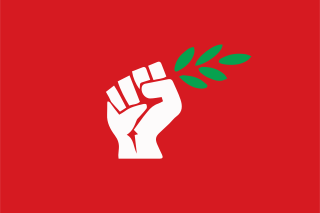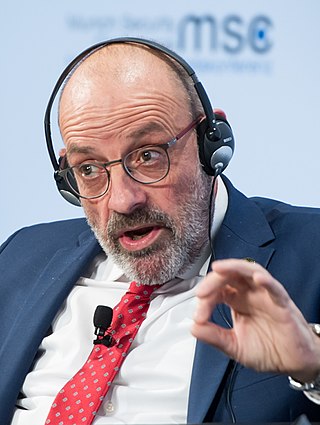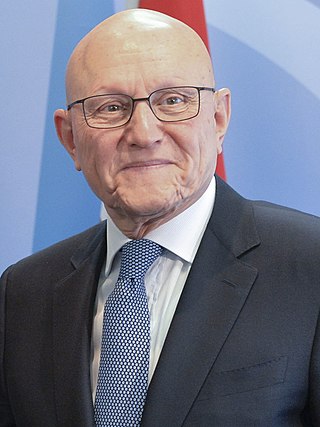 |
|---|
|
The Council of Ministers of Lebanon , known informally as the Cabinet of Lebanon, is the chief executive body of the Republic of Lebanon.
 |
|---|
|
The Council of Ministers of Lebanon , known informally as the Cabinet of Lebanon, is the chief executive body of the Republic of Lebanon.
The cabinet came after the collapse of the Fifth Cabinet of Rafic Hariri resigned in the uproar following the parliamentary extension of the presidency of Émile Lahoud for three years. The Karami cabinet itself fell six months later during the Cedar Revolution, which was sparked by the assassination of Rafik Hariri, the previous prime minister.
A temporary Lebanese government was formed on 19 April 2005, after 50 days of the resignation of the Omar Karami government. The main goal of the cabinet was to supervise the 2005 Lebanese general election, so it was headed by Najib Mikati and 14 independent ministers.
The July 2005, Lebanese cabinet was formed by Fouad Siniora on 19 July 2005 who was appointed by then president Émile Lahoud. All the main political blocs were included in it except for the Free Patriotic Movement-led bloc headed by General Michel Aoun. On 24 November 2007, the government became an interim one following the end of the president's mandate.
The July 2008 Lebanese cabinet was formed by Fouad Siniora on 11 July 2008.
In November 2009, after five months of negotiations following the 2009 parliamentary elections, Lebanese prime minister Saad Hariri formed a national unity government. [1]
On 13 June 2011, after five months of negotiations following the designation of Najib Mikati as prime minister, he formed a new government. [2]
It took 330 days of negotiations to form the Lebanese government, after the resignation of the previous Prime Minister, Najib Mikati, on March 22, 2013. The reason for these negotiations is respect for Lebanese political and confessional balances. The nomination of new Prime Minister by Parliament followed in two weeks of negotiations lasted after the fall of the previous government. Then, on 6 April, Tamman Salam was nominated as Prime Minister. He was consequently tasked by President Michel Suleiman to form a government. Despite his nomination by 124 of 128 MPs, Salam then failed to form a consensus government amidst political demands. Finally, on 15 February 2014, Salam announced a national unity government. It was made up of twenty-four ministers, including one woman.
The December 2016 cabinet was formed by prime minister Saad Harriri, appointed by President Michel Aoun. The government was the first in the President's term. It was considered resigned in May 2018 after the parliamentary elections.
The January 2019 cabinet was formed by prime minister Saad Harriri, re-appointed by President Michel Aoun following the May 2018 parliamentary elections. The government took nine months to form, as the prime minister has to reconcile various political factions in a national unity government.'
The January 2020 cabinet was formed by prime minister Hassan Diab, appointed by President Michel Aoun in reaction to the resignation of Prime Minister Saad Hariri on 29 October 2019. See also 2019-2020 Lebanese protests.
A new government was formed by Najib Mikati on the 10th of September 2021 after a 13-month-long wait for a new cabinet.

Michel Naim Aoun is a Lebanese politician and former military general who served as the President of Lebanon from 31 October 2016 until 30 October 2022.

Omar Abdul Hamid Karami was the 29th prime minister of Lebanon, who served two separate terms. He was Prime Minister for the first time from 24 December 1990, when Selim al-Hoss gave up power, until May 1992, when he resigned due to economic instability. He was again Prime Minister from October 2004 to April 2005.

The Free Patriotic Movement is a Lebanese political party. Founded by Michel Aoun in 1994, the party is currently led by Aoun's son-in-law Gebran Bassil since 2015.

Saad El-Din Rafik Al-Hariri is a Lebanese-Saudi businessman and politician who served as the prime minister of Lebanon from 2009 to 2011 and 2016 to 2020. The son of Rafic Hariri, he founded and has been leading the Future Movement party since 2007. He is seen as "the strongest figurehead" of the March 14 Alliance.

The presidentof the Lebanese Republic is the head of state of Lebanon. The president is elected by the parliament for a term of six years, which cannot be renewed immediately because they can only be renewed non-consecutively. By convention, the president is always a Maronite Christian who fulfills the same requirements as a candidate for the house of representatives, as per article 49 of the Lebanese constitution.

Fouad Siniora is a Lebanese politician, a former Prime Minister of Lebanon, a position he held from 19 July 2005 to 25 May 2008. He stepped down on 9 November 2009 in favor of Saad Hariri, the late Rafik Hariri's son. He is the leader of the parliamentary group of the Future Movement.
This is the list of the Lebanese government that was formed by Fouad Siniora on 19 July 2005 after the general elections of 2005, who was appointed by then president Émile Lahoud. All the main political blocs were included in it except for the Free Patriotic Movement-led bloc headed by General Michel Aoun. Hezbollah were firstly represented in this cabinet.
Along with the Amal Movement, Hezbollah is one of the two main parties representing the Shia community, Lebanon's largest religious bloc. Amal has made a commitment to carrying out its activities through political means, but remains a partial fighting force aiding Hezbollah when the need arises.

The March 14 Alliance, named after the date of the Cedar Revolution, was a coalition of political parties and independents in Lebanon formed in 2005 that were united by their anti-Syrian stance and by their opposition to the March 8 Alliance. It was led by Saad Hariri, Walid Jumblatt and Samir Geagea, as well as other prominent figures.

Yacoub Riad Sarraf is a Lebanese politician. He was born in the town of Miniara in the Akkar district of northern Lebanon.

The 2006–2008 Lebanese protests were a series of political protests and sit-ins in Lebanon that began on 1 December 2006, led by groups that opposed the US and Saudi-backed government of Prime Minister Fouad Siniora and ended on 21 May 2008 with the signing of the Doha Agreement. The opposition was made up of Hezbollah, Amal, and the Free Patriotic Movement (FPM); a number of smaller parties were also involved, including the Marada party, the Lebanese Communist Party and the Syrian Social Nationalist Party. A majority of the members of the government were part of the anti-Syrian March 14 Alliance, a coalition of political parties and independents in Lebanon. The two groups were also divided along religious lines, with most Sunnis and Druze supporting the government, and most Shi'a supporting the opposition. The Christian community was split between the two factions, with Michel Aoun, the leader of the FPM, claiming to have more than 70% support among the Christians, based on the results of the 2005 parliamentary election.
Charles Rizk is a Lebanese Maronite politician, who served at different cabinet posts.
The March 8 Alliance is a loose coalition of political parties and independents in Lebanon formed in 2005 that are united by their pro-Syrian stance and their opposition to the former March 14 Alliance. It was the ruling coalition in Lebanon with the government headed by Prime Minister Najib Mikati from June 2011 until March 2013. Main parties of the March 8 Alliance are part of the third Cabinet of Najib Mikati since 2021.

Najib Azmi Mikati is a Lebanese politician and businessman who has served as the prime minister of Lebanon since September 2021. He also leads a cabinet that has assumed the powers of the president of Lebanon since the term of president Michel Aoun ended in October 2022. He has previously served as prime minister from April to July 2005, and from June 2011 to February 2014. He also served as Minister of Public Works and Transport from December 1998 to 2003.

The formation of a new government led by Najib Mikati follows five months of negotiations after the fall of the Saad Hariri government. Mikati formed a controversial 30-minister cabinet. Following ruptures and tensions and two previous threats to resign, Mikati finally resigned on 23 March 2013. Tammam Salam was tasked to form a new government on 6 April 2013.
Mohammad Safadi is a Lebanese businessman who served as minister of finance under Najib Mikati between 2011 and 2014. He was also the minister of economy and trade from 2008 to 2011.

Hassan Diab is a Lebanese academic, engineer and politician who served as the prime minister of Lebanon from 21 January 2020 to 10 September 2021. He was appointed by President Michel Aoun in 2019 to succeed Saad Hariri as prime minister. He submitted his resignation on 10 August 2020 in wake of the 2020 Beirut explosion and served as caretaker prime minister until Najib Mikati formed a new government on 10 September 2021. Prior to his premiership, he served as the minister of education from June 2011 to February 2014 under President Michel Suleiman.

Tammam Saeb Salam is a Lebanese politician who was the Prime Minister of Lebanon from February 2014 until December 2016. He also served as the acting President of Lebanon from May 2014 until October 2016 in his capacity as prime minister. He previously served in the government of Lebanon as minister of culture from 2008 to 2009.

The formation of a new government led by Tammam Salam followed two weeks of negotiations after the resignation of Najib Mikati's government. Salam's candidacy was backed by the March 14 Alliance, the Progressive Socialist Party, Najib Mikati and the Amal Movement.